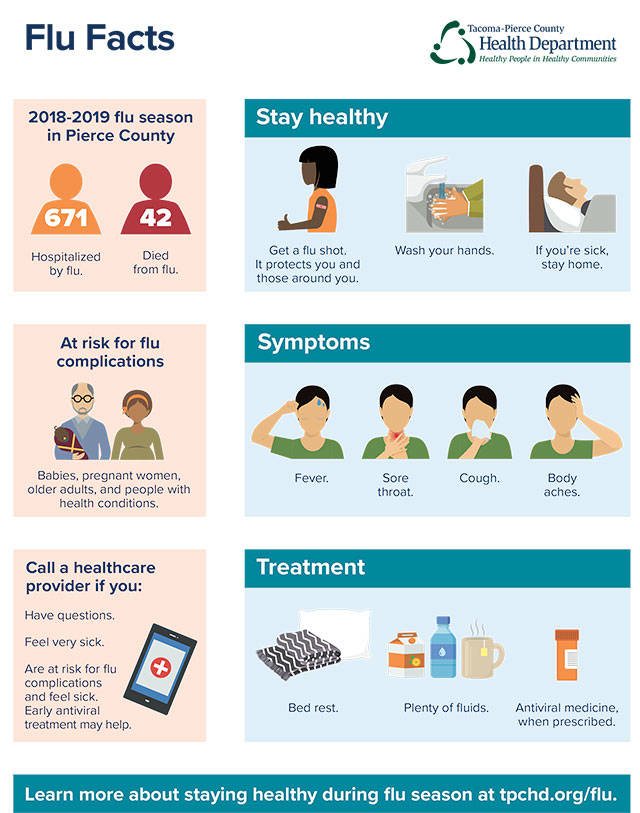The following was written by Kayla Scrivner, a Tacoma-Health Department program manager, for the TPCHD blog:
You should take influenza seriously. In recent weeks, we’ve seen a spike in flu activity across the state. We are seeing very high rates of influenza B, a strain of the flu that is very common among children. Two children in Washington—including one in Pierce County—have died from the flu this season.
Your best protection against the flu is a flu shot. It’s not too late to get yours. Talk to your healthcare provider.
All of this may seem scary. You might think if you get the flu, you should get emergency care right away. With this spike in flu activity, we’ve seen more and more people seeking treatment in emergency rooms.
The short answer is most people don’t need to go to the ER because of the flu. Most people with the flu can recover at home with rest, lots of fluids, and non-aspirin fever reducers.
HOW THE FLU HAS HIT PIERCE COUNTY
Flu has been elevated in the state and county for several weeks, and activity is now high. We are seeing increased visits to urgent care, emergency departments, and more hospitalizations. We have reports of five flu-related deaths in Pierce County so far in the 2019-2020 flu season.
People age 65 or older or very young children—under age 5, but especially under age 2—are at higher risk for flu-related complications. Other high-risk categories include people with:
- Lung problems.
- Heart problems.
- Diabetes.
- Pregnancy.
- Obesity.
- Other chronic health conditions.
Everyone’s health situation is different. If you get sick with flu symptoms and are at high risk of complications or you are concerned about your illness, contact your healthcare provider for advice.
SIGNS YOU SHOULD HEAD TO THE ER
Pay attention to the emergency signs of flu sickness. According to the Centers for Disease Control and Prevention, people with these warning signs should seek medical care right away:
IN CHILDREN
- Fast breathing or trouble breathing.
- Bluish lips or face.
- Ribs pulling in with each breath.
- Chest pain.
- Severe muscle pain (child refuses to walk).
- Dehydration (no urine for 8 hours, dry mouth, no tears when crying).
- Not alert or interacting when awake.
- Seizures.
- Fever above 104°F.
- In children less than 12 weeks, any fever.
- Worsening of chronic medical conditions.
IN ADULTS
- Difficulty breathing or shortness of breath.
- Persistent pain or pressure in the chest or abdomen.
- Persistent dizziness, confusion, inability to arouse.
- Seizures.
- Not urinating.
- Severe muscle pain.
- Severe weakness or unsteadiness.
- Worsening of chronic medical conditions.
These lists are not all inclusive. Consult your healthcare provider for other severe or concerning symptoms.
Stay home if you’re mildly sick, contact your provider for advice if you’re worried, and know the emergency signs listed above for when to head to the ER.
Remember these four steps to fight the flu:
- Get your flu shot.
- Wash your hands often.
- Cover your coughs and sneezes.
- Stay home if you’re sick.
Learn more about the flu, including where to get a flu shot at www.tpchd.org/flu.


